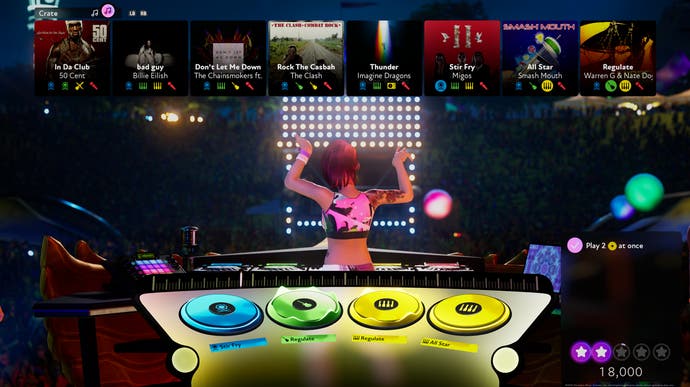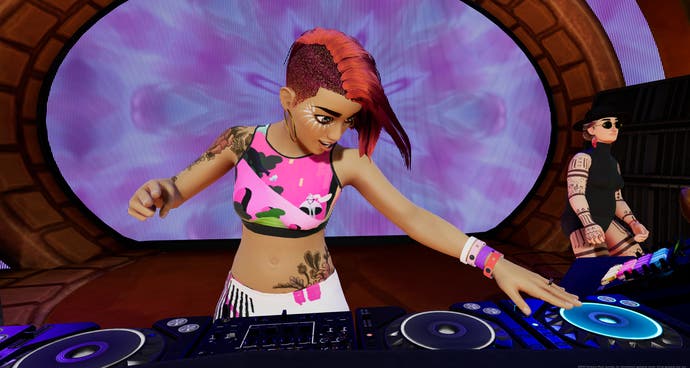Harmonix's Fuser bets on user creativity as the future of music gaming
One to marimba.
Where do you go after Guitar Hero and Rock Band? That's a question the music genre has been trying to answer for about 10 years, with varying degrees of success. Some games have looked to VR to replace the physicality of performing on peripherals, yet the platform still remains out of reach for many thanks to cost and space requirements. Others have taken risks with unique spins on rhythm-action - often brilliant in their own right, but none have captured the mass market like the guitar games of the 2000s.
Does the answer lie in user-created content? That's what Harmonix is betting on with its latest title, Fuser, a music-mixing game officially unveiled today. Part performance game, part creative tool, it's a far cry from the days of rocking out with a peripheral in your living room - instead favouring a Coachella-influencer vibe as players mix current tracks together to satisfy crowd demands.
"A lot of our traditional games - whether it's Rock Band or Dance Central, even some of the stuff we've done in VR like Audica - are very different in that those games are either a recreation of, or performance to, an existing song," Harmonix exec Dan Walsh told me during a preview session. "Fuser is a music-mixing game where you are creating things as opposed to recreating things."
Launching with over 100 tracks, players will be able to pick and choose from set song lists to develop a mix. The gameplay centres around a deck where you can play four different discs at once, with each song broken down into four components: drums, bass, lead instruments (such as guitar, synths and horns) and vocals. Players can mix these into any combination they want - even four voice parts at the same time, although this doesn't sound the best.
Oh, and there's no peripherals: just a regular release on PC, PS4, Xbox One and Switch sometime this autumn. That's pretty close to when next-gen consoles launch, but Fuser will also be playable on PS5 and Xbox Series X thanks to their backwards compatibility support, "so you won't be shut out or have to wait", Walsh confirmed.

It's an impressive bit of tech, with tracks automatically adapting to the key and tempo as they're introduced. Both can also be adjusted by the player as part of the overall mix, such as switching between major and minor. Harmonix used a similar system for its 2017 card game DropMix, in which songs were divided into parts and then mixed together on a peripheral. Fuser expands on this by giving players more creative control, allowing them to change the texture by muting tracks, or adding in custom sounds via what looked like an in-game MIDI pad with six instrument options (something Harmonix plans on detailing at a later point).
So, that's the mixing interface: how does this work as a game? Fuser is divided into three core gameplay modes: campaign, freestyle, and multiplayer. The latter is listed as two to four players in the press release, with the opportunity to "collaborate or compete with players from around the world" - but Harmonix is waiting until later on to reveal more details of how this works, too.
Freestyle gives players the opportunity to mess around, save mixes and upload them directly onto social channels. The campaign, meanwhile, is about 10-15 hours long, and follows the career of a DJ from "some level of success" to headline act.
Points are scored by fulfilling crowd requests, keeping the mix moving, and hitting mission goals such as keeping the track within set bpm parameters. You can get combos on crowd requests by dropping a track that satisfies two at once: for instance, Billie Eilish's bad guy would fulfill a request for pop, and a request for 2010s music. If you introduce new tracks on a downbeat you get bonus points, while yellow lines on the time bar indicate "musically interesting" parts of loops which are particularly suitable for changes.

In the context of the release of Media Molecule's Dreams this month, it's interesting timing for Harmonix to announce Fuser - and it feels like part of a larger trend giving players the tools to create content within a game. I asked if Harmonix felt this was the future for the music genre, too.
"At the moment, yes, just because if you look back at when rock band and Guitar Hero came out, rock star culture and the rock star fantasy were very much of that time," Walsh explained. "Late 90s, early 2000s, mid 2000s. People wanted to be on stage at Lollapalooza, they wanted to be shredding on the lead guitar out in front of thousands of people.
"Music culture has sort of shifted over the last 10-15 years to where DJ culture is influential, mashup culture is really influential. Festival culture is bigger than it's ever been right now. So this game is sort of our attempt to reflect modern music culture in a way that's still a game, but it's also creatively fulfilling in a different way than Rock Bands or Dance Central or Guitar Hero.
"From a creative standpoint, you look at influencer culture as well where people just want to create and share things all the time. And this is sort of a reflection of that, Dreams is a good reflection of that. Mario Maker is another example, Minecraft of course - it's like turning people loose into a sort of gamified playground with a lot of access to a lot of like tools and interesting and interesting things."
The music-mixing aspect of Fuser is something Harmonix has been thinking about for a while: Walsh told me the studio "started experimenting" with games Fantasia and DropMix. "[With Fuser], it feels like we figured out the rest of it, the game wrapper around it that makes it still accessible," Walsh said. Getting the balance between creative freedom and game rules was a challenge, so Harmonix tried to focus on "purposeful decisions that are also musical in a way you [can] score them.
"Figuring out that balance took a little while and some of our other experiments... I don't think quite found the way to make your creative decisions 'gaming'", Walsh added.

Given Fuser's focus on influencer-style sharing, I started to wonder how the music world's strict licensing rules would work with publishing mixes to social media. How do the music rights work with that? Well, Harmonix doesn't quite have the answer yet.
"It's definitely complicated. For normal people, you'll be able to share to your personal timeline," Walsh explained. "When it comes to like influencers or YouTubers, things of that nature... that's something that we're still working through, both with licence holders as well as platforms. We know them both very well over the years. Obviously, when the game comes out it will include guidelines on how to do it."
Is it more of a problem when people are monetising on top of the mixes they've produced?
"Monetisation does add a layer of complication... yeah, that is harder to navigate," Walsh added. "Not necessarily impossible, but still something that we're working through."

I did manage to get a little hands-on time with Fuser for 10 minutes (and watched some gameplay expertly demoed by community manager Zoe Schneider) - and I was pretty bowled over by the mixing technology on display. It's easy to use, packed with a good assortment of current hits and classics, and complex enough that players will be able to produce some unexpected mixes. Dropping new tracks on-beat was surprisingly satisfying in a different way to timing a Rock Band note, as hearing a great transition is rewarding to the ears. And there's a certain novelty to hearing Smash Mouth and Migos inexplicably work together.
That said, I'm not yet entirely convinced by the core gameplay shown in the campaign, particularly the request system. In later levels these requests come in "pretty frequently", Schneider told me - and while you can ignore them, the game encourages you to hit as many as possible to get a high score. This means the track is constantly shifting, and it often felt a little frantic and unnatural to my ear, as the music wasn't given time to settle. The alternative, I suppose, is to dial back the amount of crowd requests: but then this risks making the gameplay slow.
The idea of responding to crowd requests also seems a little weird to me, as it suggests successful music artists only follow the demands of fans - and I'm not sure how many people actually want to live out a wedding DJ fantasy. And, unfortunately, the gameplay often looks quite static. It doesn't have the drama of Rock Band - either on-screen, where rows of glowing blobs would hurtle towards you, or in the entertainment value of watching a friend perform on a peripheral in your living room. I wonder if this will impact the game's ability to spread on social media platforms, as Harmonix would clearly like.
There are still so many unknowns surrounding Fuser it's impossible to know how it's going to pan out: we still know very little about multiplayer, precisely how the custom instrument tracks work, or what players will eventually make in freestyle mode. I really admire the focus on creative elements, along with the strength of the mixing system which makes the process accessible. Personally, I can see myself spending quite a few hours in freestyle mode tinkering with tracks. But is there enough of a game amongst the mixing tools to keep me hooked? We'll see.



